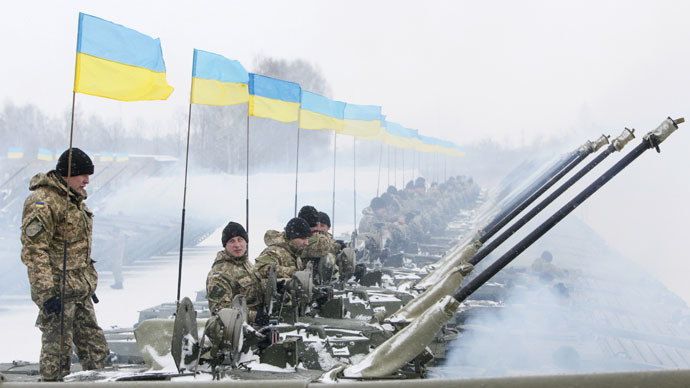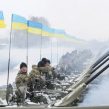
Russia’s War in Ukraine Sinks the Minsk Negotiations (Part Two)
Publication: Eurasia Daily Monitor Volume: 12 Issue: 23
By:

*To read Part One, please click here.
The breakdown of the Minsk negotiations process (see Part One in EDM, February 4) had become obvious even before its final collapse on January 31. Moscow, along with the Donetsk and Luhansk “people’s republics” (“DPR” and “LPR,” respectively) have overtly repudiated the September 2014 Minsk armistice. They demand revisions of the armistice agreements in Russia’s and “DPR-LPR’s” favor, to the extent that would nullify those agreements and any safeguards of Ukrainian interests therein.
That repudiation is only the first stage in the collapse of the Minsk process. The second stage can follow if superior Russian and proxy forces intensify their attacks, compel Ukraine to solicit a ceasefire as a last resort to avoid further reverses, and impose a new armistice agreement that would eliminate even the theoretical safeguards contained in the Minsk documents.
Western leaders blocking military assistance to Ukraine are emboldening Russia to move toward that second, final stage of killing the Minsk agreements. The withholding of that assistance is not the only source of encouragement for the Kremlin. The other major source is the West’s collective, unofficial decision at the November 2014 Brisbane G-20 summit to break the causative link between Russian aggression in Ukraine and further Western sanctions on Russia. That break remains in effect to date. Since then, Russia has sponsored elections in the “DPR-LPR”; Moscow treats these as political entities on a par with Kyiv; and Russia has unleashed offensive military operations, with an unprecedented level of direct Russian firepower and command-and-control support. Yet, no further economic sanctions on Russia ensued.
Moscow had practically announced the official collapse of the Minsk negotiations two days ahead of the January 31 meeting. “Battles will continue until the Kyiv authorities start a direct dialogue with the Donetsk and Luhansk people’s republics,” Russian presidential administration chief, Sergei Ivanov, informed officials in Moscow, in President Vladimir Putin’s presence (Interfax, January 29).
Pressuring Kyiv into some form of legitimizing the “DPR-LPR” is one of the goals behind the current military offensive. Following the Minsk meeting’s collapse, Russian Foreign Affairs Minister Sergei Lavrov warned Ukraine, “It is imperative to establish a dialogue between the Kyiv authorities and the proclaimed Donetsk and Luhansk people’s republics.” Further, Kyiv should accept the “DPR and LPR as full-fledged participants in Ukraine’s domestic conflict, and fully take their interests into account” (Interfax, February 3, 4).
Denying its own role in the military conflict, Moscow finds it advantageous to position itself as a would-be diplomatic mediator in that “inner-Ukrainian conflict.” According to Putin’s spokesman Dmitry Peskov, “The president is very concerned with the continuing fighting and is calling on all parties to the conflict to immediately stop hostilities” (TASS, February 2). Russia’s representative to the Minsk negotiations, Ambassador Mikhail Zurabov, claimed that he “tried to persuade them [Donetsk and Luhansk] to negotiate,” but his “influence proved to be limited” (Interfax, February 2).
Thus, on one hand, Russia lays claim to paramount influence on the negotiation process, ruling out any meaningful international participation. But on the other hand, it claims to lack influence on its own proxies, unleashing them against Ukraine while evading responsibility for its actions. These games are familiar from the last two decades of Russia-orchestrated “frozen conflicts,” but Western governments look continually surprised and hesitant.
Following the collapse of talks in Minsk, Ukrainian President Petro Poroshenko reaffirmed Kyiv’s position in a speech in Kharkiv, as well as in telephone calls with German Chancellor Angela Merkel and French President Francois Hollande. As Poroshenko summed up, Ukraine deems the Minsk September 2014 documents as “the only basis for a political settlement.” All stipulations in those documents should be fulfilled without preconditions or exceptions. This applies to observing the ceasefire, adhering to the September 19 demarcation line, the withdrawal of Russian troops from legally recognized Ukrainian territory, the closure of the currently open Russia-Ukraine border (with the Organization for Security and Cooperation in Europe—OSCE—monitoring all or much of the above), and local elections in “DPR-LPR”-controlled territories to be held under Ukrainian legislation. (Ukrinform, February 3).
This is Kyiv’s response to Moscow’s unilateral re-interpretation, whereby Kyiv should legitimize the “DPR-LPR” (contrary to the armistice documents) and accept the shift in the demarcation line in their favor, as preconditions to any discussion about troop withdrawal and border closure in an indefinite future (see EDM, December 16, 2014; January 27, 2015). Meanwhile, the absence of a viable monitoring organization adds to Ukraine’s vulnerabilities. Russia has disabled the OSCE mission in its present form; and any new mandate of the OSCE would fully depend on negotiations with Russia.
Russia’s goals in the weeks and months ahead seem clear: continue direct and proxy military operations to grind down Ukrainian forces and resources; shift the demarcation line to gain more territory in a piecemeal fashion, so as to de-dramatize international perceptions of this process; pressure Ukraine to sue for a ceasefire and accept a new armistice that would supersede Minsk, legitimizing this time the “DPR-LPR”; and (with or without a revised agreement) exploit Ukraine’s deteriorating military situation to destabilize the country’s internal politics. The Kremlin counts on accelerating these processes, if Western governments fail to provide Ukraine with modern defensive military capabilities.




